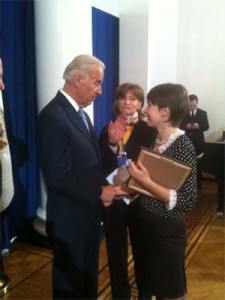
There was a time when communist states building a progressive society were accusing capitalist governments of trampling workers’ rights. Today, much of the world is controlled by “liberal” Western governments. Now, they are accusing non-liberal non-Western governments of trampling human rights and tyranny. Of course, the exploitation of workers and denial of civil rights and freedoms are evils that must be fought.
Meanwhile, there is no requirement that the struggle for human rights (workers’ rights in particular) be waged solely out of consideration for humanity and belief in a bright future; it can also be fought in support of economic competition and to acquire political dividends.
There is no country in the world without environmental problems. We need to fight to preserve the environment. Like workers’ rights, however, the environment may also be tool for applying political and economic pressure.
Vladimir Yevstafyev, a leader of the Russian Ecological Party “The Greens,” says some environmental organizations have resorted to extorting substantial funds out of major manufacturers in order to keep themselves going. These organizations are threatening manufacturers with the widespread dissemination of data and information — which is frequently inaccurate — about how they are harming the environment.
Yevgeny Makhortov, an expert of the Russian Union of Industrialists and Entrepreneurs, has said, “The ecological aspects of implementing major projects have traditionally been an instrument of political pressure.”
After the accident at the Fukushima-1 nuclear power plant, environmental organizations in the Far East remained unperturbed and philosophical about the threat that Russia’s Pacific Ocean coast could be contaminated with radioactivity. However, they woke up as soon as construction began on the ESPO oil and gas pipeline. You probably remember the splash made by the fight to save the Ussuriysk tiger. Until then, it was mainly employees of state-owned nature reserves, game wardens and forestry inspectors who were working to maintain the population of the striped predators. However, literally everyone became interested in the tigers after construction began on the ESPO.
Makhortov claims that most of the demands for environmental protection made during implementation of major projects are politically and economically motivated. He believes ESPO provides a prime example of how political pressure is brought to bear. Makhortov believes that environmental organizations in the Far East receive significant financial support from ESPO-2 opponents.
Does ESPO truly have enemies?
Yes. ESPO has its detractors. As we know, the European Union, the largest customer for Russian gas, is in a very fragile economic state. The countries of Europe are very interested in reducing their energy costs. Meanwhile diversifying Russia’s oil and gas exports streams and redirecting them to East Asia would let Russia feel more independent of the European market.
It is no secret that most environmental NGOs in Russia depend on foreign donations. That fact is not especially hidden and is not in dispute. After all, there is nothing bad about “foreign funding, and that in and of itself does not mean environmental NGOs are engaged in extortion.” But as I said above, opinions differ, and we do not have the right to ignore the views of various parties.

In March, Chirikova joined the fight against nickel ore mining in the Voronezh region that the Ural Mining and Metallurgical Company is planning. It is noteworthy that members of Ecology-21 were the first to hold protest rallies against the UMMC’s plans, but they did so in Paris and London, not in Voronezh.
The problem is that the environmental activist Chirikova is not interested in the needs of Russians. In an interview with RUSSIA! magazine, she said, “The Russian people in many ways are like cattle. They would tolerate anything… We are grateful for the support from the international community and from the U.S.”
The Russian public is very familiar with militants like Chirikova who organize revolutions in Russia with money from Western bankers.
The nickel deposits in the Voronezh Province are one of the few large untapped nickel deposits in Europe. Economic competition is the real reason for the environmental protests against UMMC’s plans.
I could cite many more examples. It is very sad that the fight to preserve nature is an instrument of economic competition and political struggle. That needs to be said so we can avoid doing the bidding of the environmental extortionists. People should not behave like cattle.
Konstantin Alexandrovich Penzev is an author and historian and a columnist for New Eastern Outlook.
